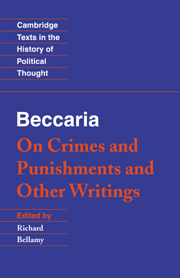Book contents
- Frontmatter
- Contents
- Acknowledgements
- Introduction
- Chronology
- Biographical glossary
- Note on the texts
- Bibliographical note
- On Crimes and Punishments
- Frontispiece
- To the Reader
- Introduction
- 1 The origin of punishment
- 2 The right to punish
- 3 Consequences
- 4 The interpretation of the laws
- 5 The obscurity of the laws
- 6 The proportion between crimes and punishments
- 7 Errors in the measuring of punishments
- 8 The classification of crimes
- 9 Of honour
- 10 Of duels
- 11 Public peace
- 12 The purpose of punishment
- 13 Of witnesses
- 14 Evidence and forms of judgement
- 15 Secret denunciations
- 16 Of torture
- 17 Of the exchequer
- 18 Of oaths
- 19 Of prompt punishments
- 20 Violent crimes
- 21 The punishment of the nobility
- 22 Theft
- 23 Public disgrace
- 24 Parasites
- 25 Banishment and confiscations
- 26 Family feeling
- 27 Lenience in punishing
- 28 The death penalty
- 29 Of detention awaiting trial
- 30 Trials and prescriptions
- 31 Crimes difficult to prove
- 32 Suicide
- 33 Smuggling
- 34 Of debtors
- 35 Asylums
- 36 On setting a price on men's heads
- 37 Attempted crimes, accomplices and immunity
- 38 Leading interrogations, depositions
- 39 Of a particular kind of crime
- 40 False ideas of utility
- 41 How to prevent crimes
- 42 The sciences
- 43 Magistrates
- 44 Public awards
- 45 Education
- 46 Pardons
- 47 Conclusion
- To Jean Baptiste d'Alembert
- To André Morellet
- Inaugural Lecture
- Reflections on the Barbarousness and the Civilisation of Nations and on the Savage State of Man
- Reflections on Manners and Customs
- On Luxury
- Index
- Cambridge Texts in the History of Political Thought
Introduction
Published online by Cambridge University Press: 05 June 2012
- Frontmatter
- Contents
- Acknowledgements
- Introduction
- Chronology
- Biographical glossary
- Note on the texts
- Bibliographical note
- On Crimes and Punishments
- Frontispiece
- To the Reader
- Introduction
- 1 The origin of punishment
- 2 The right to punish
- 3 Consequences
- 4 The interpretation of the laws
- 5 The obscurity of the laws
- 6 The proportion between crimes and punishments
- 7 Errors in the measuring of punishments
- 8 The classification of crimes
- 9 Of honour
- 10 Of duels
- 11 Public peace
- 12 The purpose of punishment
- 13 Of witnesses
- 14 Evidence and forms of judgement
- 15 Secret denunciations
- 16 Of torture
- 17 Of the exchequer
- 18 Of oaths
- 19 Of prompt punishments
- 20 Violent crimes
- 21 The punishment of the nobility
- 22 Theft
- 23 Public disgrace
- 24 Parasites
- 25 Banishment and confiscations
- 26 Family feeling
- 27 Lenience in punishing
- 28 The death penalty
- 29 Of detention awaiting trial
- 30 Trials and prescriptions
- 31 Crimes difficult to prove
- 32 Suicide
- 33 Smuggling
- 34 Of debtors
- 35 Asylums
- 36 On setting a price on men's heads
- 37 Attempted crimes, accomplices and immunity
- 38 Leading interrogations, depositions
- 39 Of a particular kind of crime
- 40 False ideas of utility
- 41 How to prevent crimes
- 42 The sciences
- 43 Magistrates
- 44 Public awards
- 45 Education
- 46 Pardons
- 47 Conclusion
- To Jean Baptiste d'Alembert
- To André Morellet
- Inaugural Lecture
- Reflections on the Barbarousness and the Civilisation of Nations and on the Savage State of Man
- Reflections on Manners and Customs
- On Luxury
- Index
- Cambridge Texts in the History of Political Thought
Summary
Beccaria's classic study On Crimes and Punishments belongs to the category of works which are much cited and little read. In Beccaria's case the reasons for this relative neglect are twofold. First, until recently even those who have attempted to read him, either in the original or in translation, have had to rely on a corrupt text. As is explained in the Note on the texts, the present edition provides the first English version of the book as it was last published and revised by Beccaria. Second, the context provided by Beccaria's other writings and those of his circle is rarely known, so that the background assumptions on which his argument rested have either appeared obscure or simply been misconstrued. As a result, Beccaria has come to be pigeon-holed as one of the founding fathers of a putative tradition of classic penal reformers, and the distinctiveness of his contribution has been recognised only rarely. His argument, however, was more complex than a number of commentators have appreciated, anticipating in an original way some of the solutions and difficulties of contemporary philosophers of punishment.
Punishment forms part of a wider system of social organisation and is sustained by a broad range of social practices, attitudes and institutions. Beccaria's argument for penal reform reflected a whole new discourse about the nature of society and the need for social change more generally, and has to be read as part of this larger movement.
- Type
- Chapter
- Information
- Beccaria: 'On Crimes and Punishments' and Other Writings , pp. ix - xxxPublisher: Cambridge University PressPrint publication year: 1995
- 2
- Cited by



